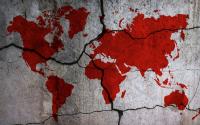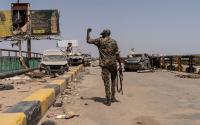20 June 2004Dexter Filkins
| MAKHMUR, Iraq, June 17 — Thousands of ethnic Kurds are pushing into lands formerly held by Iraqi Arabs, forcing tens of thousands of them to flee to ramshackle refugee camps and transforming the demographic and political map of northern Iraq. The Kurds are returning to lands from which they were expelled by the armies of Saddam Hussein and his predecessors in the Baath Party, who ordered thousands of Kurdish villages destroyed and sent waves of Iraqi Arabs north to fill the area with supporters. The new movement, which began with the fall of Mr. Hussein, appears to have quickened this spring amid confusion about American policy, along with political pressure by Kurdish leaders to resettle the areas formerly held by Arabs. It is happening at a moment when Kurds are threatening to withdraw from the national government if they are not confident of having sufficient autonomy. In Baghdad, American officials |
|
But thousands of Kurds appear to be ignoring the American orders. New Kurdish families show up every day at the camps that mark the landscape here, settling into tents and tumble-down homes as they wait to reclaim their former lands.
The Kurdish migration appears to be causing widespread misery, with Arabs complaining of expulsions and even murders at the hands of Kurdish returnees. Many of the Kurdish refugees themselves are gathered in crowded camps.
American officials say as many as 100,000 Arabs have fled their homes in north-central Iraq and are now scattered in squalid camps across the center of the country. With the anti-American insurgency raging across much of the same area, the Arab refugees appear to be receiving neither food nor shelter from the Iraqi government, relief organizations or American forces.
"The Kurds, they laughed at us, they threw tomatoes at us," said Karim Qadam, a 45-year-old father of three, now living amid the rubble of a blown-up building in Baquba, northeast of Baghdad. "They told us to get out of our homes. They told us they would kill us. They told us, `You don't own anything here anymore.' "
Ten years ago, Mr. Qadam said, Iraqi officials forced him to turn over his home in the southern city of Diwaniya and move north to the formerly Kurdish village of Khanaqaan, where he received a free parcel of farmland. Now, like the thousands of Arabs encamped in the parched plains northeast of Baghdad, Mr. Qadam, his wife and three children have no home to return to.
| The push by the Kurds into the formerly Arab-held lands, while driven by the returnees themselves, appears to be backed by the Kurdish government, which has long advocated a resettlement of the disputed area. Despite an explicit prohibition in the Iraqi interim constitution, Kurdish officials are setting up offices and exercising governmental authority in the newly settled areas. The shift in population is raising fears in Iraq that the Kurds are trying to expand their control over Iraqi territory at the same time they are suggesting that they may pull out of the Iraqi government. American officials say they are trying to fend off pressure from Kurds to move their people back into the area. "There is a lot of pressure in the Kurdish political context to bring the people who were forced out back into their hometowns," said a senior American official in Baghdad, speaking on the condition of anonymity. |
|
But local occupation officials appear in some areas to have accepted the flow of Kurds back to their homes. According to minutes of a recent meeting of occupation officials and relief workers in the northern city of Erbil, an American official said the Americans would no longer oppose Kurds' crossing the Green Line, as long as the areas they were moving into were uncontested.
And Kurdish and American officials say the occupation authority has been financing projects here in Makhmur, a formerly Arab area recently resettled by Kurds.
 (Ashley Gilbertson for The NY Times) Thousands of Arabs, like these children living in a damaged building in Baquba, have been forced from their homes in northern Iraq by Kurds.
(Ashley Gilbertson for The NY Times) Thousands of Arabs, like these children living in a damaged building in Baquba, have been forced from their homes in northern Iraq by Kurds. (Ashley Gilbertson for The New York Times.)A Kurd at his mother's grave in Makhmur, in northern Iraq. He and thousands of other Kurds, expelled years ago, have returned to the area.
(Ashley Gilbertson for The New York Times.)A Kurd at his mother's grave in Makhmur, in northern Iraq. He and thousands of other Kurds, expelled years ago, have returned to the area.





